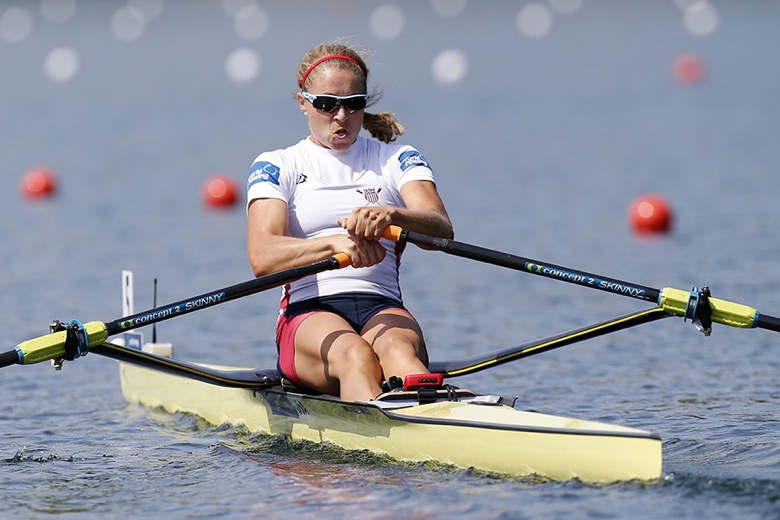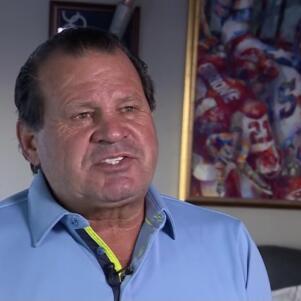The BLOG: Lifestyle
Life lessons on the water
Diane Kilgore | October 21, 2016

(Peter Klaunzer/Keystone via AP)
Recitation of Genevra Stone’s accomplishments on and off the water are a simple Google search away. The well documented 31-year-old gal from Newton studied at the Winsor School, attended Princeton University and in 2014 graduated from Tufts Medical School. Competing in this summer’s Olympics in Rio de Janeiro as a member of the U.S. rowing team and earning a silver medal are two of Dr. Stone’s many other accomplishments. Details of her days are online everywhere, which allowed our chat to focus less on the logistics of rowing and more on the merits of the sport’s greater lessons. Our conversation was a snapshot of how applying oneself to a challenge, especially when you can’t see where you’re headed, can be the best determinant of success.
This weekend Gevvie, as she’s commonly known, will compete once again on a familiar course. Navigating the river she’s known all of her life, Stone will race in the Head of the Charles Regatta in the Champ 1x and Champ 8+ competitions. Regatta heats will run Saturday the 22nd, concluding Sunday the 23rd. Dr. Stone has won the singles of the internationally significant race six times. These accomplishments are noteworthy as feats of athleticism. Coupled with her academic achievements they are also testament to Stone’s perseverance emotionally, intellectually, and physically. Her sterling success story is one of tenacity. Like many who earn recognition, Stone found a way to succeed even when the course ahead wasn’t straight forward.
Raised in a home with two parents who rowed on the sport’s most elite level, it’s easy to assume Gevvie would row competitively, but she’s taken somewhat of an uncharted course to and from the boat house. Mom, Lisa Hansen, represented the U.S. at the 1976 Olympics in Montreal. Dad Gregg made the 1980 team but missed the boat, so to speak, to compete as an Olympian. That year the U.S. government boycotted the Olympics as a protest of the Soviet Union’s invasion of Afghanistan. Not qualifying for a place on the 1976 team, his dreams of Olympic competition were twice dashed. The family’s enthusiasm for all that rowing offers is part of the story Dr. Stone tells when explaining how rowing up-stream can be an asset when searching for a resolute stream of consciousness.
Gevvie was a well rounded athlete as a kid. To the credit of her parents, rowing was recognized as their sport of choice, not hers. She joined all sorts of teams at Winsor. “Gentle coaching” was the phrase Gevvie used to describe her dad’s introductory approach to the sport. She explored rowing by his side, with their backs to the finish line. As a member of the Winsor Wildcats the rowing team-mates earned two national titles, adding trophies to the school’s collection of hard-earned hardware. Stone was quick to say winning added to her interest in competitive rowing, but she also loved the fun of lacrosse matches, even though it wasn’t her athletic forté.
Reflecting on her time at Princeton and Tufts Medical School, Gevvie said she became increasingly aware complexities of the sport added balance to her academic pursuits. Describing it as an “outlet,” rowing obliquely reinforced skills she needs to succeed in medicine. The sport complimented her power of concentration, underscored the value of teamwork, and proved perseverance is key to achieving most goals.
The fundamentals of rowing are of equal importance in medicine, said Stone, who recalled five of 11 college teammates at Princeton were enrolled in pre-med classes. She went on to say many Ivy League schools support the sport because the principle of striving for excellence is the underlying intellectual commitment of both rowing and elite academia. For her, “discipline, practice, and an awareness of nuance strengthens both athletes and scholars.”
Part of the conversation with Dr. Stone reflected her commitment to use rowing as an asset when struggling with life’s unforeseen challenges. Even though she didn’t earn a spot on every team she tried out for, rowing has been a constant in her ever-changing life. Overcoming disappointments, pushing past pain thresholds, and maintaining mental focus are more psychological than biological benefits of the sport that has been an aid to rowing over lost opportunities, boyfriend “break-up-itis”, and a 2009 leg-snapping, take-down in a Central Square snowball fight with friends.
The Head of the Charles is a three-mile, up-stream, lactic-acid-producing race and the world’s largest two-day regatta. Scullers will be at the starting line at 7 a.m. ready to navigate alone or with their team along the river’s subtle bends and under picturesque bridges over Boston’s iconic blue ribbon. Accommodating the rigors of training and competition, Dr. Stone has been on a sabbatical from medicine with plans to begin her residency next June. Once her residency begins it’s her plan to find time to row recreationally.
This year’s event is likely to be a sentimental one for Stone, family and friends. For years determination has lead the champion to 6 a.m. river launches from the Weld Boathouse. Most mornings March through November even the darkness and cold of the Charles hasn’t distracted Gevvie from focusing on her grip, posture or stroke quality. She feels the weather, knows the currents and intuitively reads the contours of the river in her mind. The gentle bends of the Charles are frequent obstacles for racers who can’t visualize or anticipate their subtleties. Pre-dawn practice, discipline and awareness of nuance are clear-eyed advantages for this elite athlete/scientist.
The Head of the Charles Regatta holds memories for hundreds of thousands of people. It began Oct. 16, 1965 as a competition to replicate those held in England. The day’s events were coordinated with the help of IBM and MIT timekeepers. That year many colleges of Boston competed against rowers representing Andover Academy, The Belmont Hill School, Brown University, Choate, Dartmouth, Exeter Academy, Marist College, The Philadelphia Girls Rowing Club, and the University of Pennsylvania to name a few. By comparison this year’s Head of the Charles will represent locals and a field from across the globe. With so many eager participants the international draw rejects more applications than it can accept. Successful competitors earned race qualification or gained admission through a lottery.
Fifty-one years since the first competition, river banks are now crowed with spectators gathered to tailgate, learn about the sport through sponsored demonstrations, and to cheer on rowers. Much of Stone’s time on the Charles has been spent being coached or coaching others. But for an occasional Canada goose, and the quiet company of lots of fish many times Gevvie has trained in solitude. Reflecting on the past, Stone says in 2014, competitor, Princeton alum, and Olympic teammate Kate Bertko was a challenge on the River just before the Eliot Bridge. As Gevvie passed her longtime friend both women heard the excitement of cheering crowds, especially the chants from a fellow Princeton-ian that adds a special bond to her collection of poignant river memories.
Hundreds of thousands of Regatta enthusiasts bank Charles River memories. So, too, do Bostonians who see its ripples routinely as part of the hometown landscape. This weekend it will be the Hub of International competition. Its river-scapes will be loud, colorful and teeming with energy. Even before the boats launch, the athletes push off, and the blankets dot the view its aqua-rhythm can also be seen as a communal centerpiece of dedicated inspiration. The Charles has taught Dr. Genevra Stone lessons that transcend the river. Its gifts have formed skills, bonded friends, traveled the world, and taught the ultimate value of hard work. Challenges race along Boston’s blue ribbon history. The Charles and the doctor remind us, even when we can’t quite see where we’re headed, tenacity is often the well documented determinant of success.
GO GEVVIE GO!
Contact Diane Kilgore at [email protected].






